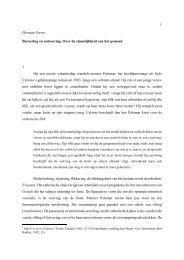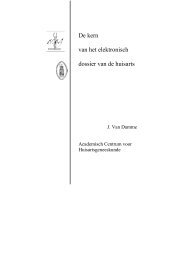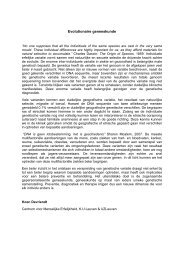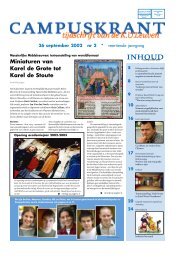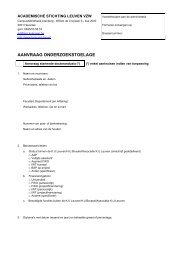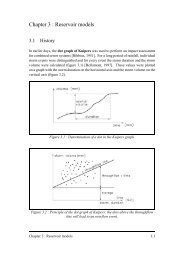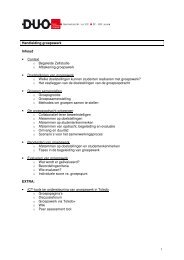EQUALITY GUIdE - KU Leuven
EQUALITY GUIdE - KU Leuven
EQUALITY GUIdE - KU Leuven
You also want an ePaper? Increase the reach of your titles
YUMPU automatically turns print PDFs into web optimized ePapers that Google loves.
Chapter 3 ! Career management 163<br />
Illustration: check on the evaluation of the ZAP<br />
What?<br />
It is determined by decree since 1999 that the job performance of academic staff members needs to<br />
be evaluated at least once in every five years. An evaluation has to take place three years after the<br />
first appointment or after every designation or promotion.<br />
Procedure?<br />
The University Board lays down the rules for evaluating job performance and the way in which members<br />
of the Academic personnel work. The evaluation procedure is regulated by the Academic Council.<br />
The University Board laid down a certain procedure: a faculty evaluative commission per faculty<br />
and a general evaluative commission per group was founded. The evaluation is made on motivated<br />
decisions by the authorized general evaluative commission, based on the non-binding, motivated<br />
propositions of the authorized faculty evaluative commission.<br />
The members of the senior academic staff (ZAP) are evaluated based on the way they fulfil their<br />
assignment, educational tasks, research tasks and any tasks of service. The Human Resources Department<br />
is responsible for the preparation of the file in collaboration with the Research Coordination<br />
Office. The member itself is not involved nor asked for input in this preliminary stage of the procedure<br />
due to administrative simplification. The staff member in question is informed of the end result by<br />
letter. The possibility for further feedback is given, which is done orally by the chairperson of the<br />
evaluative commission or by personnel director ZAP of the HR-department. This feedback is actually<br />
asked for.<br />
The percentage of negative evaluations is on the average approximately 0.015%.<br />
Evaluation?<br />
Transparency:<br />
Most of the information above could be found on the website of the HR-department.<br />
For more detailed information, the cooperation of the personnel director ZAP was asked, who kindly<br />
invited us for a personal interview.<br />
The members of the senior academic staff also have access to the evaluation procedure on the website.<br />
However, the member is not asked for input nor involved in the procedure itself. It is also not<br />
clear which criteria are most important and how the evaluation as such is done.<br />
Often, more information is only given during feedback and if asked for.<br />
Objectivity:<br />
The file distinguishes three main criteria, though not every criterion is as important as the other ones.<br />
The two most important criteria are the research output and the education evaluation. As neither<br />
training nor instructions are given to the members of the different commissions, it is hard to guarantee<br />
the objectivity. Each commission can have a different idea on what is a good or bad performance of a<br />
member, between the commissions of each faculty and between the consecutive commissions. Uniformity<br />
should be seen as crucial and is essential to guarantee equal opportunities for all staff.<br />
Effectiveness:<br />
As the evaluation is still in an early stage of execution, it is hard to evaluate the effectiveness at this<br />
stage.<br />
At this moment, the university tries to meet the rules, as determined by decree. In the long term, the<br />
HR-department will use the evaluation as an instrument for further career guidance and performance<br />
interviews.



